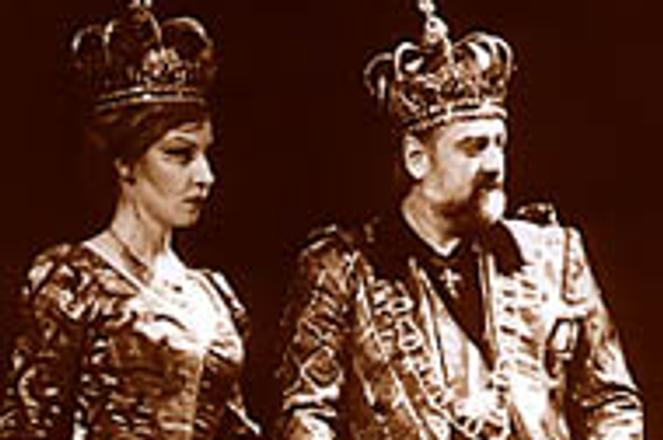Thomas's Hamlet plays tricks with the plot: Queen Gertruda (Denisa Hamarová) lives while King Claudius (Ján Galla) is stabbed by Hamlet.photo:Katarína Marenčinová
Hamlet
Composer:Ambroise Thomas
Next performance:October 20
Where: Slovenské národné divadlo (Slovak National Theatre, Hviezdoslavovo námestie 1)
Rating: 8 out of 10
The Slovak National Theatre (SND) has chosen to bring new blood into its repertoire this season and stage the opera version of Shakespeare's classic Hamlet for the first time ever in Slovakia. This version, by nineteenth century French artist Ambroise Thomas, a relative unknown among modern opera aficianados, is the composer's best work besides the opéra comique 'Mignon'.
The script was compiled by two contemporary librettists to match the tastes of the period, in which light and entertaining operettas were preferred over the rich and complex psychology of the original characters.
As a result, the familiar plot is dramatically altered. Hamlet's mother, Queen Gertrude, does not unwittingly drink the poisoned wine, but instead is spared to live out her days in a convent. Ophelia's blood-lusty brother Laertes also lives, and even forgives Hamlet the death of his beloved sister. King Claudius is stabbed to death in front of the Danish court by Hamlet, who also defies Shakespeare's intentions by surviving to become the next King of Denmark.
The molding of Shakespeare's Hamlet and the unknown Thomas' Hamlet created an air of expectation and curiosity for Bratislava opera-goers before the first two performances on October 5 and 7. After the shows, it was clear that the SND had made the right decision in bringing the opera to Bratislava. The piece is interesting and dramatic throughout, the stage and scenery are fetching, and costume designer Ľudmila Várossová has created an alluring variety of dress, with the lone exception being the Russian 'tsarist' style guards' costumes in the first act.
The stars of the show were unmistakably the two main characters, Ophelia and Hamlet. Hamlet, performed on opening night by Vladimír Chmelo and by Ján Ďurčo during the second premier, was particularly impressive in that he stays on stage almost continuously while delivering outstanding vocal performances.
Hamlet's aria about wine was so stirring that it has the potential to become as revered as the aria from Puccini's La Boheme. Hamlet also shines during his scene with Queen Gertrude, when he wants to punish his mother despite his father's wish to the contrary.
But his brightest moment comes in the final scene of the third act in which the music conveys his burdened mind by switching furiously from the lightness of the wine aria (to reflect that Hamlet is, after all, just a normal guy in love with Ophelia) to dark and brooding tones (to reflect the pain of knowing that something is indeed "rotten" in Denmark).
Ophelia's crowning moment comes after a pause in the fourth act - and not a moment too soon. The actresses playing Ophelia - Ľubica Vargicová during the first premiere, Adriana Kohútková at the second showing - are coloratura sopranos, the highest-pitched of all sopranos. When the anticipated singing fails to appear through the first three acts, during which the ladies instead must sing in lower tones to which coloratura sopranos are not suited, viewers begin to wonder if the moment will ever come.
But it does come - the scene in which Ophelia shows that she's gone mad is beautifully performed by both singers, who put their hearts into the aria, cleverly placed towards the end of the opera thus motivating the audience to stay till the end.
Peter Mikuláš, Slovakia's premier basso profundo, also delivers a virtuoso performance (as always) in his supporting role as King Claudius.
The ballet scenes during the introduction of the the first and third acts were a disappointment, as the orchestra's musical selections were sub-par throughout the evening and did not have the strong singing of Hamlet or Ophelia to mask their mediocrity. The scenes were also uncomfortable in that the SND stage is designed for a maximum of 60 performers at once, while the ballets exceeded the limit leaving the impression of a traffic jam of dancers.
During his glory days, Thomas (1832-1894) was one of the most respected opera composers in France, enjoying fame comparable to that of Verdi in Italy. Hamlet debuted at the Paris Opéra in 1868 and was performed over 300 times before the end of the century. It was rediscovered in the 1960s and 1970s, thanks primarily to the singing of international star baritone Sherill Milnes.


